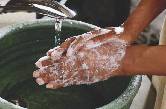FDA Wants Tighter Rules on Antibacterial Soaps, Body Washes
Makers would have to prove they're safe and effective.
The U.S. Food and Drug Administration said Monday that it wants makers of antibacterial hand soaps and body washes to prove their products are safe for long-term daily use and more effective than regular soaps in preventing illness and the spread of certain infections.

Millions of Americans use antibacterial soaps and body washes.
They are used every day at home, at work, at schools and in other public settings where the risk of bacterial infection is relatively low. There should be clearly demonstrated benefits from using antibacterial soaps to balance any potential risk.
FDA has not been provided with data that shows these products are "any more effective at preventing people from getting sick than washing with plain soap and water."
The agency's proposed rule would require makers of these products to justify their health claims with firm evidence of their benefit.
Manufacturers would be required to conduct clinical trials that demonstrate that their products are more effective than plain soap and water in preventing illness or the spread of certain infections.
Manufacturers would also be required to provide additional safety data for these products before they can be considered generally recognized as safe for use.
There's some data that long-term exposure to certain ingredients used in these products, such as triclosan (liquid soaps) and triclocarban (bar soaps), could promote bacterial resistance or have effects on hormones. These hormones include estrogen, testosterone and thyroid hormones.
Reformulating would mean that companies would have to remove the antibacterial active ingredient, and relabeling would mean removal of the antibacterial claim from the product's label.
The proposed rule does not require that these soaps be taken off the market now. The agency has been considering the issue since 2005 and this is not something that is going to happen immediately. The agency hopes to issue its final rule by September 2016.
In the meantime, people should continue to be diligent about washing their hands, particularly at this time of year to help protect against the spread of colds and flu. If soap and water aren't available, an alcohol-based hand sanitizer that contains at least 60 percent alcohol should be used, the FDA said.
Several doctors said they were heartened by the FDA's proposal.
"There is no link between antibacterial products and a decline in infection rates," said expert. "Simply washing thoroughly with plain soap is sufficient to reduce bacteria and is effective against viruses.
"However, there are risks and disadvantages on the use of antibacterial products, including soaps and body wash, such as the possibility of development of antibiotic resistance," expert added.
Given our emerging understanding of chemicals as hormone disruptors, this is a remarkable and positive step toward protecting children. Given suggestive evidence associating triclosan exposure with allergies and concerns about promoting antibiotic resistance, there is little justification for widespread use of triclosan when soap and water or alcohol-based hand sanitizers are available.
Source: U.S. Dept. of Health & Human Services
- 354 reads
Human Rights
Fostering a More Humane World: The 28th Eurasian Economic Summi

Conscience, Hope, and Action: Keys to Global Peace and Sustainability

Ringing FOWPAL’s Peace Bell for the World:Nobel Peace Prize Laureates’ Visions and Actions

Protecting the World’s Cultural Diversity for a Sustainable Future

Puppet Show I International Friendship Day 2020

